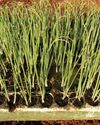
FAST FACTS
- Blueberries have no hair roots and therefore struggle to take up nutrients.
- Calcium can only be applied for a limited period.
- Nitrogen must be applied in the right form in order to maximise production of fruit.
Blueberries are a relatively new crop to South Africa, and with the frequent arrival of new varieties, finding the right recipe for optimal production is no easy matter. At the same time, the price of blueberries is decreasing after hitting a peak two years ago, which means that farmers now need to make the most from every input and hectare to ensure their sustainability.
Unfortunately, their task is made far harder by the blueberry plant’s notorious inefficiency at absorbing calcium (Ca) and nitrogen (N), both of which are key elements required for a good fruit crop. Simply adding more of either nutrient doesn’t solve the problem. Instead, growers are advised to relook at application rates and methods, and the different forms of the elements.
CALCIUM
An adequate level of Ca improves both the quality and shelf life of blueberries. Low Ca levels, however, have far more to do with the crop than with fertiliser.
Dr David Marks, a founder of UK-based Levity Crop Science, says that to understand why Ca applications are inefficient, farmers need to understand three basic rules on plant Ca metabolism: capacity, transport, and absorption. “Plants cannot store excess Ca as they can other nutrients, such as potassium. When the holding sites for Ca in cell walls are full, plants precipitate any extra Ca being absorbed. Often, plants that are deficient in fruit still precipitate Ca from their leaves.
Bu hikaye Farmer's Weekly dergisinin Farmer's Weekly 21 October 2022 sayısından alınmıştır.
Start your 7-day Magzter GOLD free trial to access thousands of curated premium stories, and 9,000+ magazines and newspapers.
Already a subscriber ? Giriş Yap
Bu hikaye Farmer's Weekly dergisinin Farmer's Weekly 21 October 2022 sayısından alınmıştır.
Start your 7-day Magzter GOLD free trial to access thousands of curated premium stories, and 9,000+ magazines and newspapers.
Already a subscriber? Giriş Yap

Onion sowing choices
Your particular growing conditions will dictate whether you should use seedbeds, direct seeding, or plugs for sowing onions

Golden cattle for the bushveld
This article showed that a carefully selected new crossbreed offered sound advantages for extensive ranching in harsh areas.

The ins and outs of alpaca farming
The South African alpaca industry is on the rise, says Alison Notley, president of the South African Alpaca Breeders’ Society and owner of Helderstroom Alpacas near Villiersdorp. She spoke to Sinenhlanhla Mncwango about the origin of this gentle camelid and how its fleece is being processed into quality products.

Cheese and Rosemary Scones
Easy-to-make savoury treats that are great for lunch boxes.

Cape Town on a budget: a smart stay at the Holiday Inn Express
What's the best way to enjoy Cape Town's top food and nightlife without having to splurge on a five-star hotel? Brian Berkman has some good suggestions.

Managing grazing and hay production in Eragrostis fields
Summer is almost gone, so it’s time to start thinking about your pastures and hay for winter

Protecting the king of the hornbills
It is estimated that the southern ground hornbill’s original range in South Africa has decreased by two-thirds over the past century. Mike Burgess looks at the threats facing this iconic hornbill species and what is being done to halt its decline, including custodianship programmes that motivate landowners to protect it.

Jam-packed year for Volkswagen
It is going to be a busy year for Volkswagen as the German carmaker introduces a host of new passenger and commercial vehicles to the South African market. Charl Bosch attended the annual VW Indaba in Kariega, Eastern Cape, to get a glimpse of its 2025 product roll-out.

How to achieve ostrich product perfection
Ostrich farming is a well-established industry in South Africa which, aside from meat, produces feathers and leather that are in demand around the world. Dr Anel Engelbrecht, ostrich researcher at the Western Cape Department of Agriculture’s Oudtshoorn Research Farm, shared tips with Glenneis Kriel on how farmers can improve the quality of their ostrich feathers and leather.

Building the macadamia puzzle one insight at a time
Trees that produce good yields of quality nuts form the foundation of a successful macadamia farm. Leaving no stone unturned in his approach, farmer Hentie van der Merwe has proven that paying attention to every factor that influences his crop yields the best results.